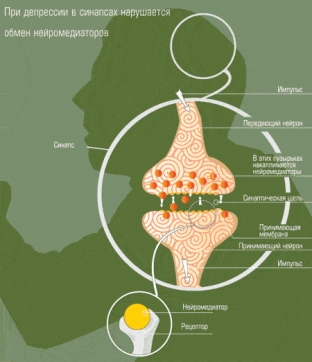Millions of processes take place every second in our body: cells are regenerated, hormones are produced, toxins are eliminated, etc. The production of hormones is called a biochemical process that affects our overall health, mood, well-being and sleep. If there is a violation of the production of at least one homon, there is a failure in the whole organism.
Today we will look at how serotonin and the manifestations of depression are related. Does a decrease in the level of this hormone always cause depression, or can it be associated with other factors?
What is the hormone serotonin responsible for
As you know, serotonin is called the hormone of happiness. It is a neurotransmitter that transmits impulses between nerve cells. With its lack, a state of anxiety arises, depression appears, mood deteriorates, a manic syndrome occurs, aggressive behavior, cravings for sweets, sleep is disturbed, movements slow down, concentration of attention drops, interest in sex decreases.
This is due to the fact that the connection between nerve cells is disrupted due to the absence or shortage of this neurotransmitter. Therefore, most antidepressants aim to increase serotonin levels.
Also, the degree of this hormone can greatly influence the perception of others and their own relationships. If the level is lowered, we think that people have interpersonal problems. We are able to see them where they are not. Conversely, if serotonin is normal, we are happier and able to see the joy of other people.
Among other things, serotonin affects: the presence of headaches, appetite, the development of phobias, libido, body temperature, obsessive thoughts, social disorders, memory quality, learning and memorization processes. The regulation of the endocrine system is also in his power.
Having the right level of this hormone affects the ability to relax.
How does depression occur?
As we have found out, depression can occur with a lack of serotonin. However, there are no assays that can clearly determine the level of this neurotransmitter in living brain cells. We cannot say for sure whether it is reduced or normal, except to assess the behavioral signs and the physiological state of the patient.

Depression is also not always associated with a decrease in the level of this hormone. Most often, this is a combination of many factors (increase in stress hormones, deterioration of the immune system, lack of nutrition or destruction of brain cells, etc.), including serotonin balance. Moreover, social factors (low self-esteem, dissatisfaction with the standard of living, loneliness) can also be the cause of depression.
Antidepressants, serotonin and depression
The increase in serotonin, for example, in women, is affected by the hormone estrogen, notes estet-portal.com. It is thanks to him that during PMS the mood can deteriorate or often change. Physical activity and sufficient sunlight can also increase its amount.
As you know, antidepressants are often used to raise the level of serotonin. But if you decide to use them, you should know:
- Did the decrease in serotonin really cause your depression?
- What are the risks associated with taking them?
- Can I combine them with other medicines?
- Are they addictive?
- Does depression come back when I stop taking antidepressants?
Be sure to find out as much as possible about the effect of a particular drug before agreeing to take it. Perhaps there are other ways to overcome your particular case of depression.
You should probably start with positive thinking and a trip to a psychologist before taking such drastic measures. Explore all possible ways to get out of the situation, including meditation and other ways to relax. Accurate determination of the cause of depression – pledge of your recovery.
After all, as soon as you stop taking the pills, she may come back again. Perhaps a combination of different ways to overcome it is the best way out for you.






Add a comment